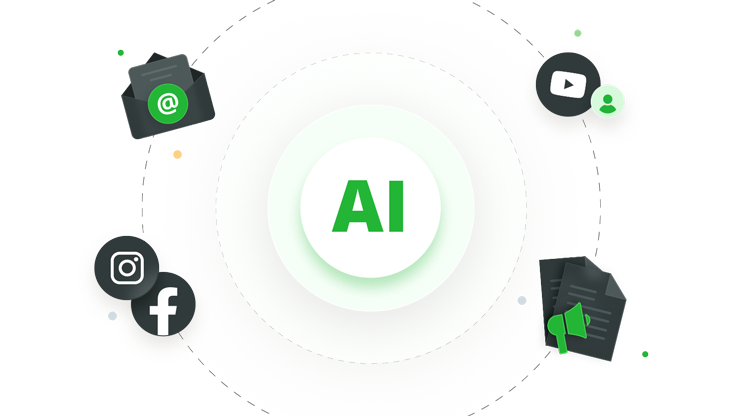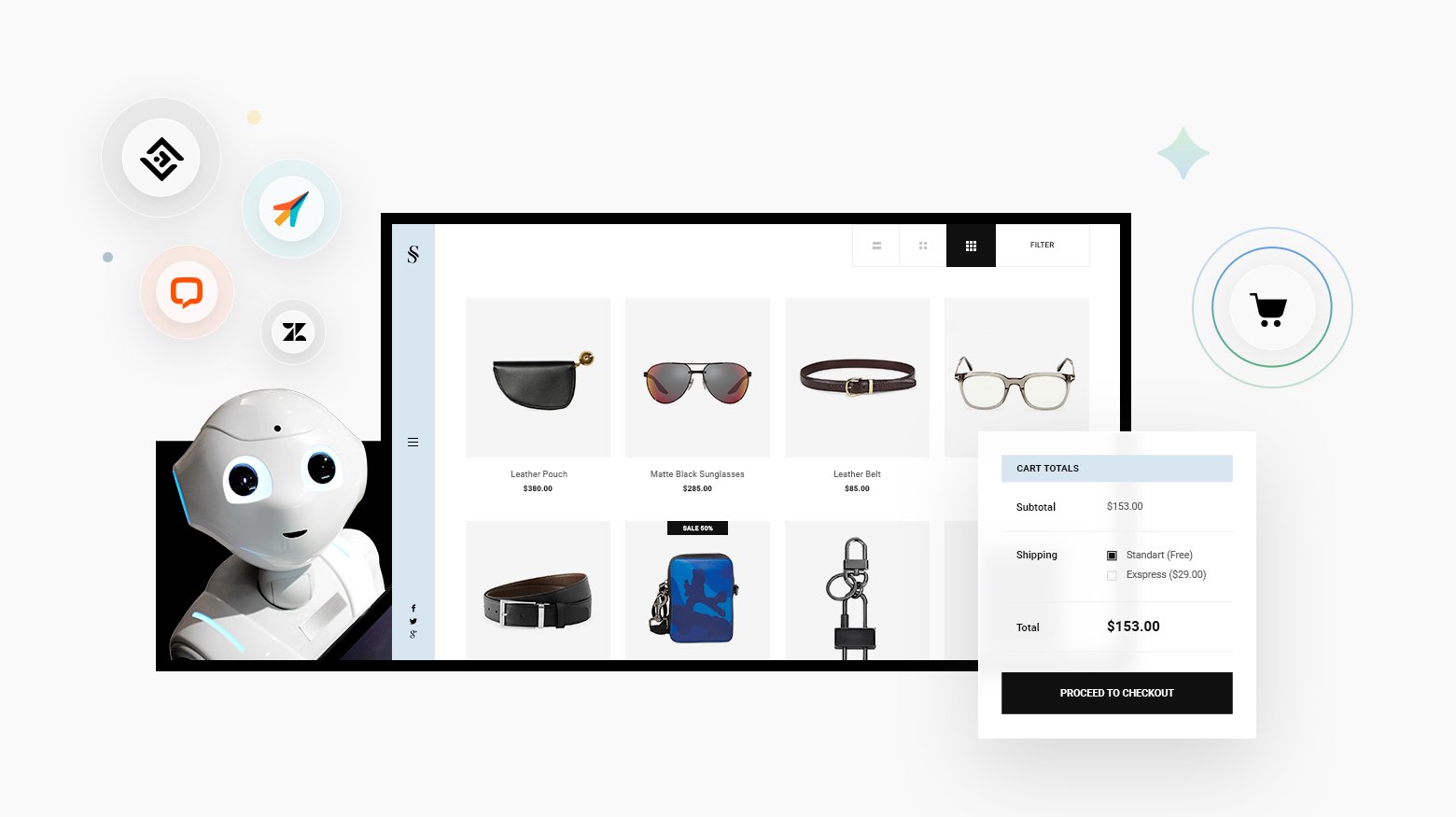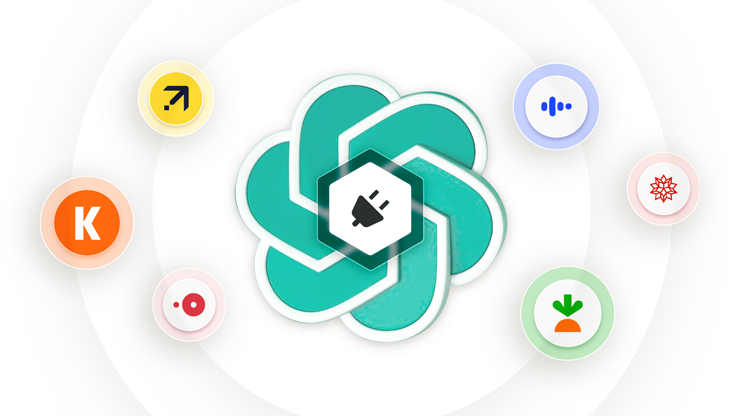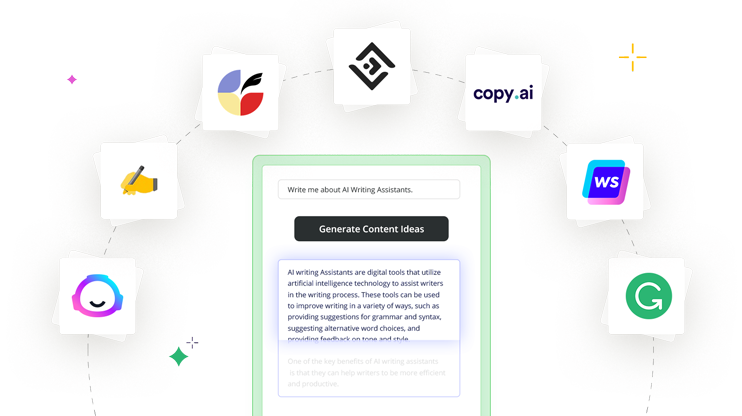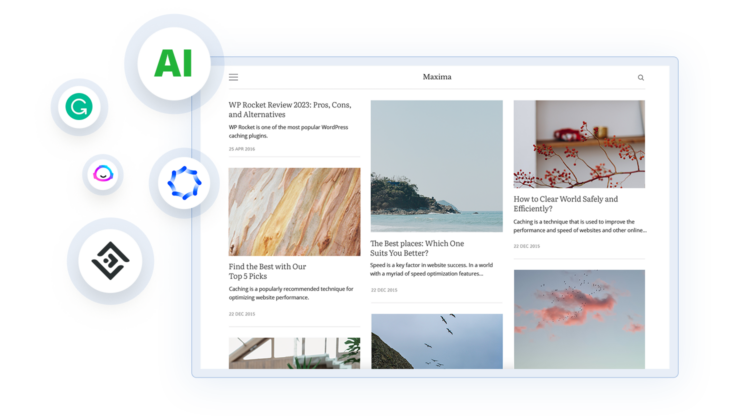In the rapidly evolving digital landscape, the fusion of artificial intelligence (AI) with web development has opened a new frontier for building sophisticated and intuitive websites.
Gone are the days when AI’s role in website creation was confined to basic automated design tasks. Today, AI extends its capabilities beyond even full-fledged website builders, offering tools that cater to every aspect of the website development process. This includes tasks traditionally reserved for graphic designers, content creators, SEO specialists, and IT professionals managing hosting environments.
From AI-driven design tools that automate the creation of user interfaces and graphics to sophisticated algorithms that optimize content for search engines, the scope of AI for website building is vast. AI-powered chatbots can engage visitors with personalized experiences, while AI-driven hosting services ensure optimal site performance and security.
This blog post aims to explore the diverse range of AI tools available for website building, shedding light on how developers and designers can leverage these technologies to streamline workflows, enhance creativity, and deliver websites that stand out in the digital age.
Whether you’re a seasoned developer, a graphic designer, or a business owner looking to establish a strong online presence, understanding the breadth of AI tools at your disposal can transform the way you approach website creation.
Get a head start on website creation with AI
Create a custom website tailored to your business needs 10X faster with 10Web AI Website Builder!
The evolution of AI for website building
The journey of AI for website building is a testament to how technology can evolve and revolutionize industries.
Initially, AI’s role was largely confined to automating simple tasks, such as suggesting templates based on the website’s intended purpose or auto-generating content layouts. These early examples of AI for website building offered users without extensive coding knowledge a gateway into web development, democratizing the ability to create and launch websites.
However, as AI website building technology advanced, so did its scope of applications in website development. The expansion augmented more specialized fields traditionally dominated by human experts. In graphic design, AI tools began to offer not just templated designs but the creation of unique graphics, logos, and user interfaces tailored to specific brand identities and aesthetics. This shift allowed for a more nuanced and personalized design process, aligning closer with the vision and requirements of each project.
In content creation, AI’s evolution brought forth tools capable of generating not just placeholders but fully formed, contextually relevant content. From blog posts to product descriptions, AI writing assistants now help fill websites with compelling, original content at a fraction of the time it would take a human writer.
Search Engine Optimization (SEO) also saw a significant impact from AI, with tools analyzing vast amounts of data to provide recommendations on optimizing content to rank higher in search engine results. These AI-powered SEO assistants guide on keyword usage, content structure, and even backlink strategies, making the once arcane art of SEO more accessible to website owners.
Finally, hosting and website performance optimization have benefited from AI, with intelligent algorithms managing server loads, detecting security threats, and optimizing content delivery for speed and reliability. These advancements ensure websites are not only easily created but also performant and secure, catering to the modern internet user’s expectations.
Through these expansions, AI has not only simplified the technical aspects of website building but also enhanced the creative process, allowing developers and designers to push boundaries and innovate. The evolution from simple AI for website building to comprehensive development tools showcases AI’s growing importance in creating more dynamic, efficient, and personalized web experiences.
The rise of AI website builders
AI website builders cater to a wide range of users, from individuals with minimal technical skills to professionals looking to streamline their workflows. Here are some of the general benefits of using AI for website building:
- Efficiency: AI accelerates the website creation process by automating tasks such as layout design, content generation, and SEO optimization. This allows for rapid deployment of websites, which is especially beneficial in fast-paced business environments.
- Cost-Effectiveness: By reducing the need for extensive human labor in the initial stages of website development, AI tools can significantly lower the costs associated with creating and maintaining a website.
- Accessibility: AI website builders are designed with user-friendliness in mind, making website creation accessible to a broader audience. Users without coding expertise can easily design, build, and manage websites that still meet professional standards.
Top AI website builders: a comparative overview
10Web
10Web uniquely positions itself in the market by using AI to generate WordPress-ready templates from URLs, making it a valuable tool for users looking to migrate or replicate existing websites onto the WordPress platform. With an Elementor-based editor, 10Web also facilitates deep customization and styling post-AI generation.
Wix
Wix stands out for its combination of practicality and extensive features, making it a popular choice among both novices and experienced users. It offers a free plan with optional paid upgrades for those seeking advanced functionalities. The platform’s Artificial Design Intelligence (ADI) system simplifies the website-building process by generating custom website templates based on user responses to a few simple questions.
Hostinger
Hostinger is recognized for its logo and copy generation capabilities, providing an affordable solution packed with unique AI features. Despite its lack of an app store and limited design options, Hostinger’s AI website generator, AI Writer, AI Logo Maker, and AI Heatmap offer substantial value, especially for users focused on branding and content.
Shopify
Shopify offers an AI-powered platform for businesses looking to launch an online store that simplifies e-commerce website creation. With comprehensive solutions that include inventory management, payment processing, and marketing tools, Shopify is a one-stop shop for merchants aiming to establish a robust online presence.
Jimdo
Jimdo provides a streamlined AI site creation process that appeals to users looking for simplicity and efficiency. The platform’s AI, known as Dolphin, assists in quickly generating a functional website, which can then be customized in detail through its standard site editor.
GoDaddy Airo
GoDaddy Airo is an AI tool designed to make website creation as straightforward as possible for users of all skill levels. Airo guides users through the process, leveraging AI to make design and content suggestions that align with the user’s goals.
TeleportHQ
TeleportHQ differentiates itself by leveraging ChatGPT to offer an AI website and UI generator capable of quick prototyping and optimization. This platform is particularly suited for developers looking for a seamless transition from idea to prototype, supported by AI-driven insights.
Appy Pie
Appy Pie extends the utility of AI beyond website building, enabling the conversion of AI-powered websites into mobile apps. This feature is particularly appealing for businesses aiming to enhance their mobile presence, although the platform’s design capabilities may be considered more lightweight compared to other options.
Each AI website builder offers unique features and benefits, catering to a diverse range of needs and preferences. Whether you’re a business owner looking to launch an e-commerce platform, a freelancer aiming to showcase your portfolio, or a developer seeking efficient ways to prototype, an AI website building tool can streamline your process.
Beyond today’s powerful AI website builders, it’s clear the influence of artificial intelligence extends far beyond just piecing together the structural elements of websites.
From refining user interfaces with intelligent design algorithms to crafting brand identities with AI-generated logos, these tools complement the foundational work done by AI website builders.
AI-powered design and graphic creation tools
In the realm of website development, the aesthetic appeal of a site plays a crucial role in engaging users and conveying the site’s purpose. AI has significantly enhanced the capabilities of designers and developers in creating visually stunning websites with tools that automate and optimize graphic design and layout creation.
AI for images
For generating images during website building, tools like DALL-E, Craiyon, and Midjourney offer unique capabilities. They create images from text prompts, varying in ease of use, customization, and licensing. These tools cater to a broad spectrum of needs, from website visuals to e-commerce products, enhancing digital content with creativity and precision.
AI for UI/UX design
AI technologies like Adobe’s Sensei are transforming how designers approach their craft. Adobe Sensei’s AI for website building streamlines the design process by automating mundane tasks, offering insights into user behavior, and predicting future design trends.

This not only expedites the creative workflow but also ensures that the final designs are optimized for user engagement and satisfaction. The impact of AI in UI/UX design is profound, enabling designers to focus on innovation while AI handles the intricacies of analysis and optimization.
Logo and branding with AI
The creation of logos and the broader task of branding have been revolutionized by AI-powered tools.
Platforms employing AI, such as Brandmark.io and Canva’s logo maker, have made it possible for anyone to design professional-quality logos tailored to their brand’s identity. These AI tools are indispensable when building a website as they analyze key brand elements like the name, industry, and color preferences to generate a variety of logo options.
Beyond logos, they offer comprehensive brand kits, ensuring consistency across all marketing materials. This approach democratizes access to high-quality branding, previously only achievable with significant design investment, providing businesses with AI for website building tools to easily craft their visual identity.
AI’s integration into design and branding tools is not merely a trend but a significant shift towards more accessible, efficient, and personalized web experiences. As these technologies continue to evolve, they promise to empower creators further, making sophisticated design more accessible than ever before.
AI writers for web content
For those seeking to elevate their content strategy, tools like Grammarly, Rytr, and Jasper AI provide robust solutions.
Grammarly, renowned for its real-time grammar, punctuation, and style suggestions, is indispensable for crafting flawless written content. It benefits non-native English speakers or anyone looking to polish their writing to professional standards.
Jasper AI stands out for its versatility in content creation, offering over 52 writing templates for various use cases, including blog articles, email subject lines, and social media posts. It’s designed to produce content rapidly, helping businesses keep up with their content demands without sacrificing quality.
For a broader range of creative writing needs, Copy.ai provides an array of tools and templates that aid in generating content quickly and efficiently, from blog posts to social media updates. It supports team collaboration and integrates with CMS platforms, streamlining the content creation process for marketers and content creators alike.
Content strategy and SEO
AI tools are also reshaping content strategy and SEO optimization. MarketMuse focuses on AI-driven content research and optimization, offering content briefs and first draft generation to kickstart the writing process. It’s a powerful ally for those aiming to create high-quality, SEO-optimized content that resonates with their target audience.
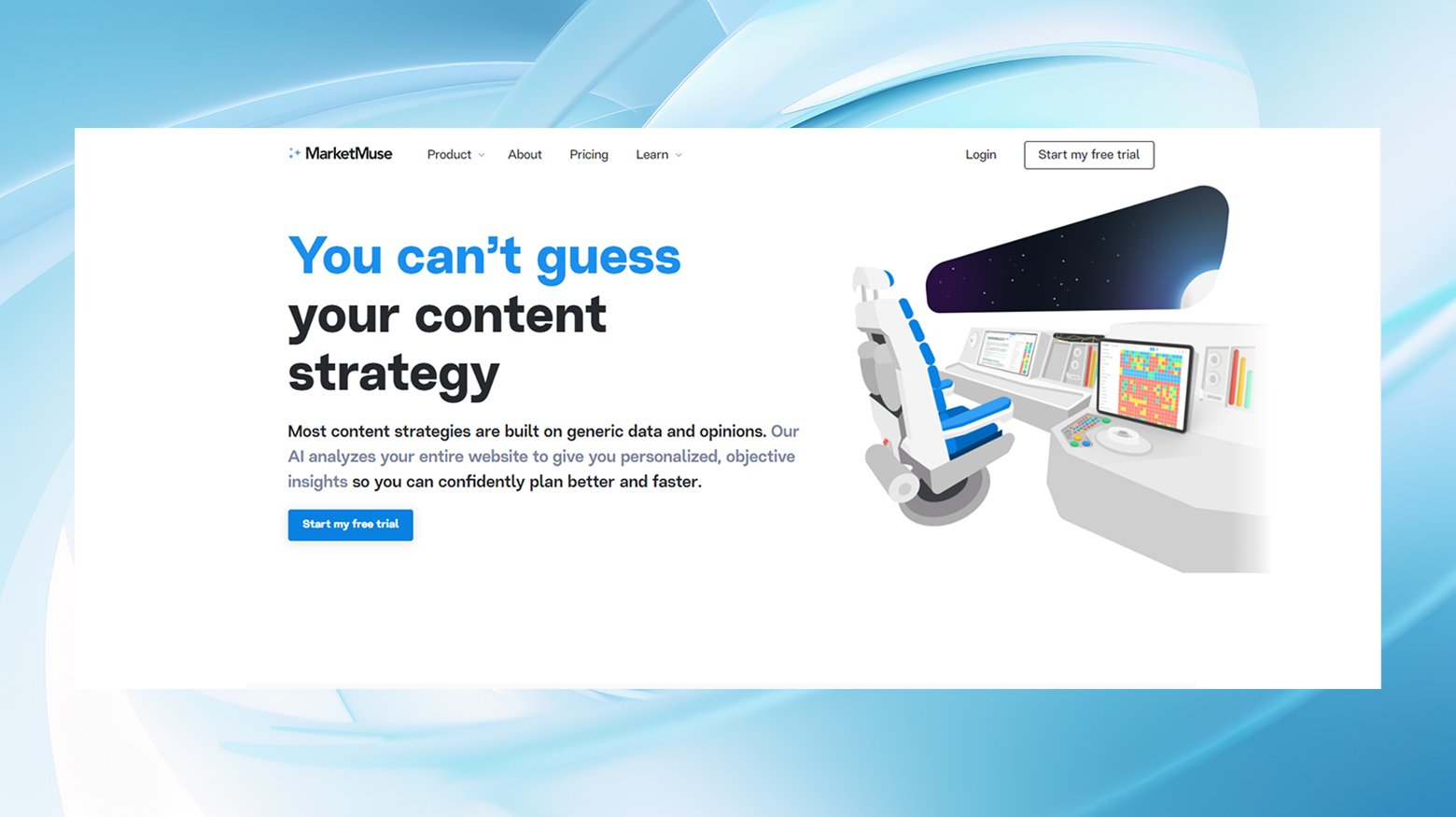
Integrating AI into content creation and management tools offers unprecedented efficiency and quality in digital marketing efforts. By leveraging these AI for website building tools, businesses and content creators can significantly enhance their productivity, reach a wider audience, and achieve their content marketing goals with greater precision and less effort.
Enhancing user experience with AI
The dynamic capabilities of AI extend significantly into enhancing the user experience on websites. By integrating intelligent systems that can interact, learn, and adapt, websites can offer visitors more personalized and engaging experiences. A key area where AI substantially impacts is through chatbots and customer support.
Chatbots and customer support
AI-powered chatbots like Tidio and Netomi are revolutionizing online customer support by automating responses and providing personalized assistance.
Tidio, for instance, specializes in automating a significant portion of customer inquiries without the need for code, offering an intuitive interface for crafting conversation flows and integrating seamlessly with various platforms, including CRMs and social media. This not only boosts the efficiency of customer support teams but also enhances user experience through timely and relevant interactions.
Netomi takes customer support further by employing advanced Natural Language Understanding to automate query resolution across email, chat, messaging, and voice platforms. It’s capable of generating answers from a knowledge base and improves over time through reinforcement learning. This level of sophistication in handling customer service operations helps businesses provide near-human support without the constant need for human intervention.
AI for website building and code generation
The advent of AI for website building within the development ecosystem has not only streamlined design and content creation but has also made significant strides in the area of coding itself. AI-driven code assistants have become invaluable tools for developers, offering insights, suggesting optimizations, and even generating code snippets and entire functions to accelerate the development process.
Code assistants
A prime example of this innovation is GitHub Copilot. Powered by OpenAI’s Codex, Copilot serves as a virtual pair programmer, suggesting code snippets and entire functions in real-time within the code editor.
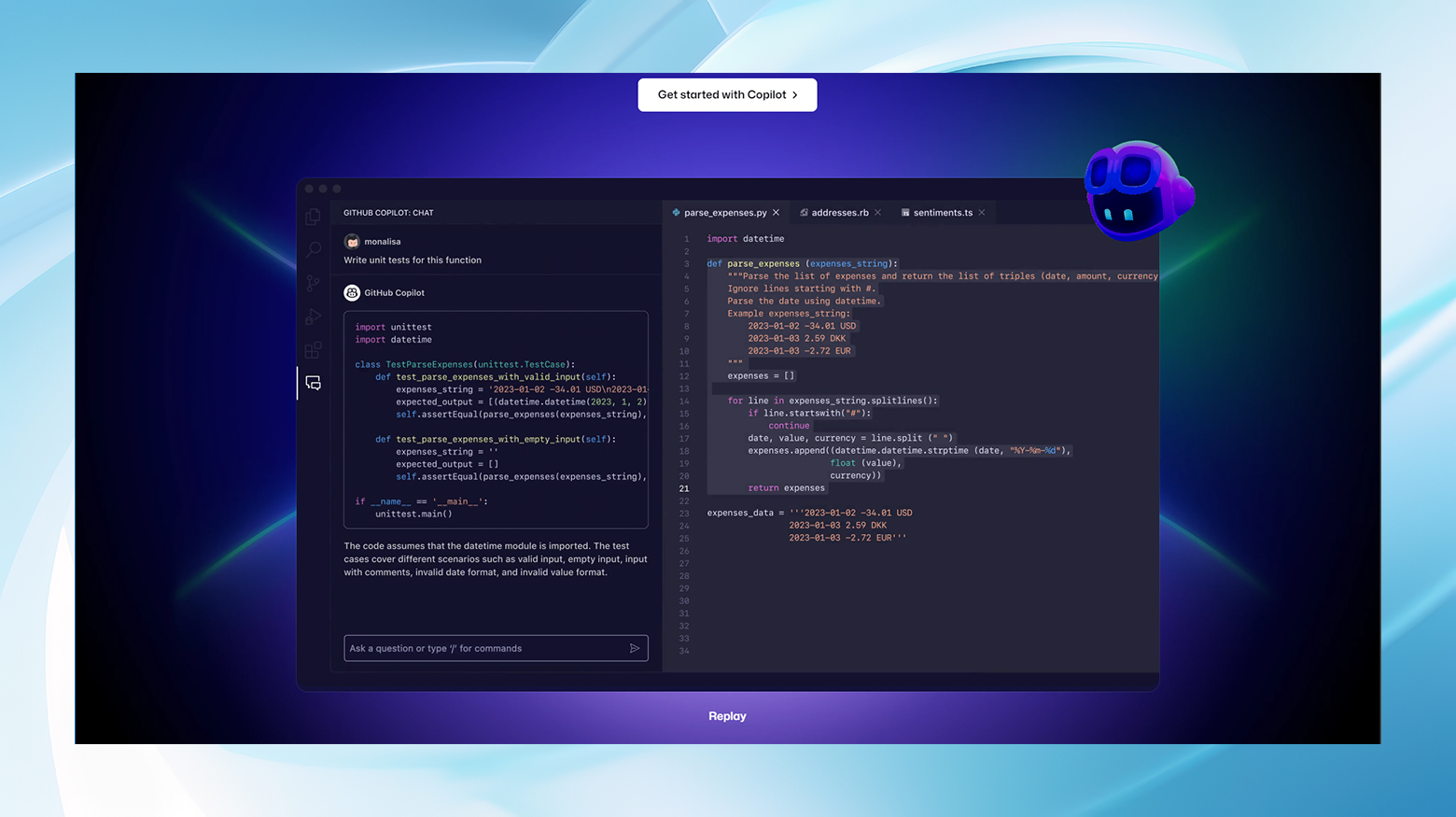
This AI assistant can understand the context of the project you’re working on and offer coding suggestions that align with your intent, significantly reducing the time spent on routine coding tasks and debugging.
GitHub Copilot is designed to learn from the vast repository of code available on GitHub, making its suggestions smarter and more refined over time. It’s an example of how AI can transform the coding process, making it more efficient and accessible to developers of all skill levels.
The implications of such technology are profound, as it not only aids in coding tasks but also serves as a learning tool for developers, exposing them to new approaches and best practices in coding.
By integrating AI code assistants like GitHub Copilot into their workflow, developers can focus more on strategic problem-solving and innovation rather than getting bogged down by routine coding tasks.
AI for website prototyping
In the initial stages of web development, bringing a concept to life through prototyping can often be one of the most time-consuming phases. However, AI has also begun to carve a niche for itself in this area, with tools designed to streamline and enhance the prototyping process.
A notable tool in this domain is Uizard, which leverages AI to transform hand-drawn sketches into digital design prototypes.
Uizard’s AI technology can interpret a sketch’s rough outlines and scribbles, converting them into functional and visually appealing digital prototypes. This process accelerates the transition from idea to prototype and democratizes design by making it accessible to those without extensive experience in digital design tools.
With Uizard, a sketch on a napkin can evolve into a working prototype in a matter of minutes, enabling rapid iteration and development.
This advancement in AI for website prototyping opens new doors for designers and developers alike, allowing for a more fluid creative process. Ideas can be tested and refined with unprecedented speed, fostering innovation and collaboration in web development projects.
The outlook for AI-powered website building
The emergence of the multitude of AI tools for website building and development heralds a new era of efficiency, creativity, and personalized user experiences. From the initial stages of design and content creation to the complexities of hosting and performance optimization, AI for website building offers vast possibilities to web developers and designers.
These tools not only simplify tasks that once required extensive manual effort but also open up new avenues for innovation, allowing for the creation of web experiences that were previously unimaginable.
As we move forward, the role of AI in web development is set to grow even more significant. By experimenting with and adopting these AI tools, web professionals can enhance their projects in ways that truly make a difference, not just for their clients or companies but for the end-users who experience the web in increasingly dynamic and interactive ways.
The future of web development is here, and AI powers it. Embrace it, experiment with it responsibly, and watch as it transforms the way we create and interact with the digital world.
Get a head start on website creation with AI
Create a custom website tailored to your business needs 10X faster with 10Web AI Website Builder!







